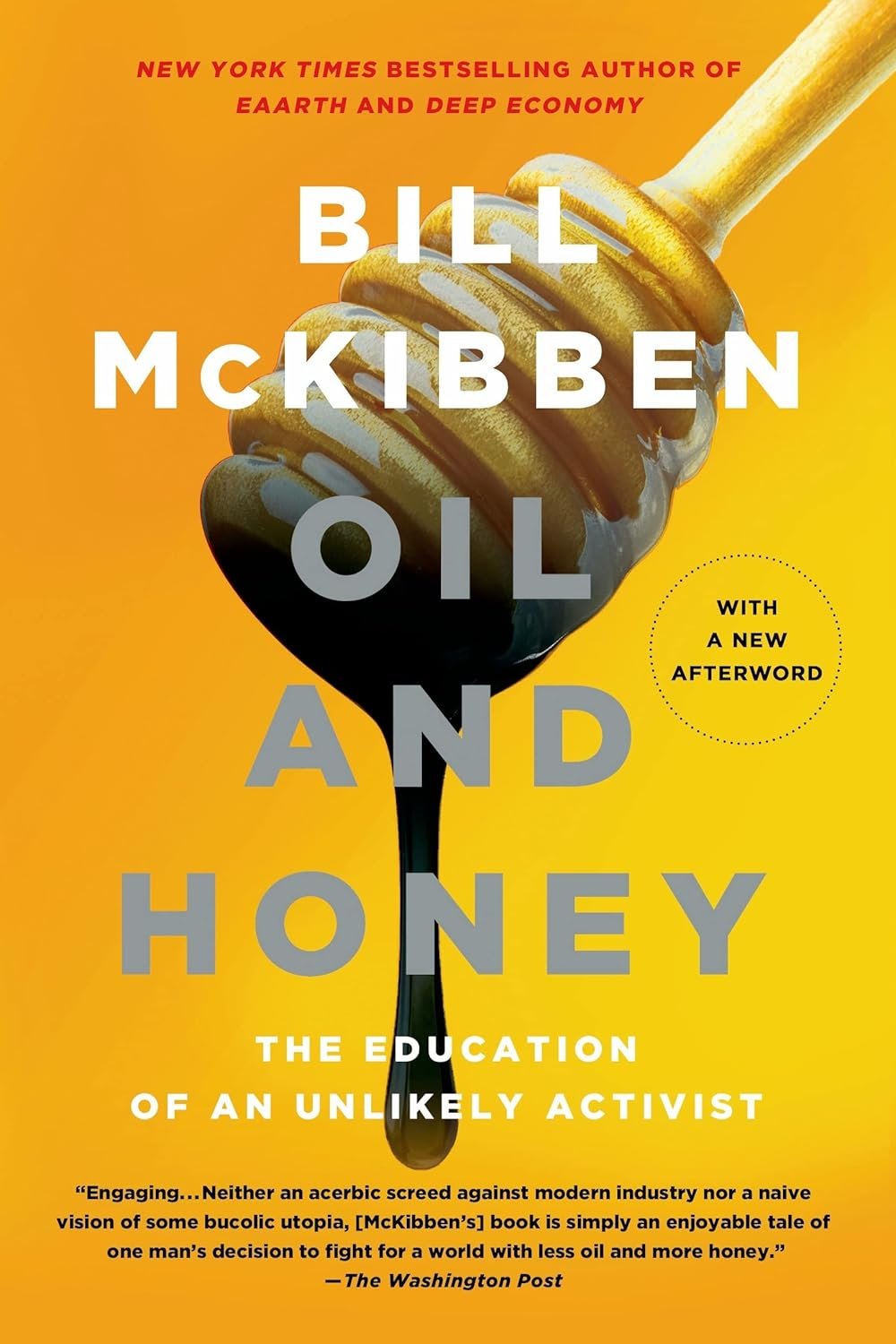Cure Tooth Decay: Heal and Prevent Cavities with Nutrition
by Ramiel Nagel
December 2014
Now there is a natural way to take control of your dental health by changing the food that you eat. Cure Tooth Decay is based upon the pioneering nutritional program of dentist Weston Price, former head of research at the National Dental Association. Dr. Price's program proved to be 90-95% or more effective in remineralizing tooth cavities utilizing only nutritional improvements in the diet. Cure Tooth Decay is the result of five years of research and trial and error that started as one father's journey to cure his daughter's rapidly progressing tooth decay.
Oil and Honey: The Education of an Unlikely Activist
by Bill McKibben
November, 2014
With the Arctic melting, the Midwest in drought, and Irene scouring the Atlantic, McKibben recognized that action was needed if solutions were to be found. Some of those would come at the local level, where McKibben joins forces with a Vermont beekeeper raising his hives as part of the growing trend toward local food. Other solutions would come from a much larger fight against the fossil-fuel industry as a whole.
Oil and Honey is McKibben's account of these two necessary and mutually reinforcing sides of the global climate fight―from the center of the maelstrom and from the growing hive of small-scale local answers to climate change.
A Modern Quest for the Spirit
by Ehrenfried Pfeiffer
October 2014
This book contains Pfeiffers autobiographical memoirs on etheric research and nutrition, the etherization of the blood, the function of the heart and letters from his estate with contributions by Lexie Ahrens and Paul Scharff, M.D.
The Unsettling of America: Culture & Agriculture
by Wendell Berry
September 2014
Since its publication by Sierra Club Books in 1977, The Unsettling of America has been recognized as a classic of American letters. In it, Wendell Berry argues that good farming is a cultural development and spiritual discipline. Todays agribusiness, however, takes farming out of its cultural context and away from families. As a result, we as a nation are more estranged from the land, from the intimate knowledge, love, and care of it.
Diary of on Early American Boy: Noah Blake 1805
by Eric Sloane
August 2014
For his fifteenth birthday in 1805, young Noah Blake's parents gave him a little leatherbound diary in which he recorded the various activities on his father's farm. This reprint of an actual early nineteenth-century book provides today's readers with a delightful rarity a view of bygone days through the eyes of a young boy. Eric Sloane has taken the notebook with its brief comments and expanded the daily entries with explanatory narrative and 72 of his own remarkable drawings.
Verbal and graphic sketches detail the construction of an entire backwoods farm as well as such common tasks as making nails, building a bridge, splitting shingles, spring plowing, and maple-sugaring.
Invasive Plant Medicine: The Ecological Benefits and Healing Abilities of Invasives
by Timothy Lee Scott
July, 2014
Most of the invasive plant species under attack for disruption of local ecosystems in the United States are from Asia, where they play an important role in traditional healing. In opposition to the loud chorus of those clamoring for the eradication of all these plants that, to the casual observer, appear to be a threat to native flora, Timothy Scott shows how these opportunistic plants are restoring health to Earth’s ecosystems.
The Soul of Money: Reclaiming the Wealth of Our Inner Resources
by Lynne Twist
June, 2014
This compelling and fundamentally liberating book shows us that examining our attitudes toward money―earning it, spending it, and giving it away―can offer surprising insight into our lives, our values, and the essence of prosperity. Through personal stories and practical advice, global activist Lynne Twist demonstrates how we can replace feelings of scarcity, guilt, and burden with experiences of sufficiency, freedom, and purpose. Twist takes an honest and critical look at the extraordinary power that money wields over our lives and its profound and often destructive influence on our self-image and relationships. In a consumer society that glorifies the pitch, the sale, and the insatiable appetite for more as a measure of self-worth, ?The Soul of Money? asks us to step back, to examine our relationship with money, to assess our connection with core human values, and to change this relationship and, in so doing, to transform our lives.
Stalking the Wild Asparagus
by Euell Gibbons
May, 2014
Euell Gibbons was one of the few people in this country to devote a considerable part of his life to the adventure of living off the land. He sought out wild plants all over North America and turned ordinary fruits and vegetable into delicious dishes. His book includes recipes for vegetable and casserole dishes, breads, cakes, muffins and twenty different pies. Plus jellies, jams, teas, and wines, and how to sweeten them with wild honey or homemade maple syrup.
The Good Life: Helen and Scott Nearing’s Sixty Years of Self-Sufficient Living
by Helen and Scott Nearing
April, 2014
The Good Life is the Classic on rural homesteading. Helen and Scott Nearing abandoned New York City for a rural life in Jamaica Vermont with minimal cash and the knowledge of self reliance and good health. Their tale began the move
Cows Save the Planet: And Other Improbable Ways of Restoring Soil to Heal the Earth
by Judith D. Schwarz
March, 2014
In Cows Save the Planet, journalist Judith D. Schwartz looks at soil as a crucible for our many overlapping environmental, economic, and social crises. Schwartz reveals that for many of these problems―climate change, desertification, biodiversity loss, droughts, floods, wildfires, rural poverty, malnutrition, and obesity―there are positive, alternative scenarios to the degradation and devastation we face. In each case, our ability to turn these crises into opportunities depends on how we treat the soil.
Desert or Paradise: Restoring Endangered Landscape Using Water Management, Including Lake and Pond Construction
by Sepp Holzer
February, 2014
His first book, Sepp Holzers Permaculture, offers a detailed guide to what Holzer has achieved on his farm. Many readers might have wondered, but how can we acheive this on a global scale? This newest book, Desert or Paradise, examines Holzer’s core philosophy for increasing for production, earth health, and reconnecting mankind with nature, applied to reforestation and water conservation across the world.
The Boy Who Harnessed the Wind: Creating Currents of Electricity and Hope
by William Kamkwamba
January, 2014
William Kamkwamba was born in Malawi, a country where magic ruled and modern science was mystery. It was also a land withered by drought and hunger. But William had read about windmills, and he dreamed of building one that would bring to his small village a set of luxuries that only 2 percent of Malawians could enjoy: electricity and running water. His neighbors called him misala—crazy—but William refused to let go of his dreams.












